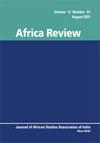印度洋地区的后殖民主义是新殖民主义:查戈斯群岛的案例是通过以非洲为中心的非殖民主义理论视角来看的
IF 0.5
Q4 AREA STUDIES
引用次数: 1
摘要
查戈斯岛的地位仍然是国际关系中斗争的主题,使英国和美国与查戈斯群岛的土著人民进行斗争,这些土著人民被迫流离失所和流亡,以容纳美国在东方土地上参与邪恶冲突的军事基地。毛里求斯加入这场斗争的基础是,这些岛屿是在1968年独立前夕被英国人从毛里求斯分离出来的。几十年来,查戈斯人一直坚持他们的自决权和返回祖先土地的权利,将他们的斗争推向伦敦街头和国际法庭。尽管他们的事业在世界各地得到越来越多的支持,尽管他们在法庭和联合国取得了一些胜利,但由于英国和美国拒绝采取公正和公平的行动,他们的梦想仍然被推迟。这是新殖民主义继续困扰后殖民非洲的一个典型例子,使独立变得毫无意义,因为非洲任何地方的不公正都是对整个非洲的不公正。本文认为,运用非殖民主义的分析视角,结合非洲反殖民主义的观点,使我们能够理解查戈斯人面临的根本问题,并为这一困境想出更持久的解决办法。本文章由计算机程序翻译,如有差异,请以英文原文为准。
The post-colonial is neocolonial in the Indian Ocean region: the case of Chagos seen through the African-centred decolonial theoretical lens
ABSTRACT The status of the Chagos Island remains a subject of struggle in international relations pitting the United Kingdom and, by extension, the U.S. against the indigenous people of the Chagos who were forcibly displaced and exiled in order to accommodate a U.S. military base involved in evil conflicts in the lands of the Orient. Mauritius joined this struggle on the basis that the islands were separated from Mauritius by the British on the eve of independence in 1968. The Chagosians have for decades insisted on their right to self-determination and their right to return to the land of their ancestors, taking their battles to the streets of London and international courts. In spite of the growing support for their cause around the world and although they have scored some victories in courts and at the United Nations, their dreams remain deferred as the U.K. and the U.S. refuse to act justly and fairly. This is a classic case of neocolonial continuities that haunt post-colonial Africa, rendering independence meaningless for injustice anywhere in Africa is injustice against the whole of Africa. This paper suggests that the use of a decolonial lens of analysis infused with African anti-colonial perspectives enables us to understand the fundamental problems facing the Chagosians and to think of more permanent solutions to this quagmire.
求助全文
通过发布文献求助,成功后即可免费获取论文全文。
去求助
来源期刊

Africa Review
AREA STUDIES-
CiteScore
1.80
自引率
12.50%
发文量
22
期刊介绍:
Africa Review is an interdisciplinary academic journal of the African Studies Association of India (ASA India) and focuses on theoretical, historical, literary and developmental enquiries related to African affairs. The central aim of the journal is to promote a scholarly understanding of developments and change in Africa, publishing both original scholarship on developments in individual countries as well as comparative analyses examining the wider region. The journal serves the full spectrum of social science disciplinary communities, including anthropology, archaeology, history, law, sociology, demography, development studies, economics, education, gender studies, industrial relations, literature, politics and urban studies.
 求助内容:
求助内容: 应助结果提醒方式:
应助结果提醒方式:


